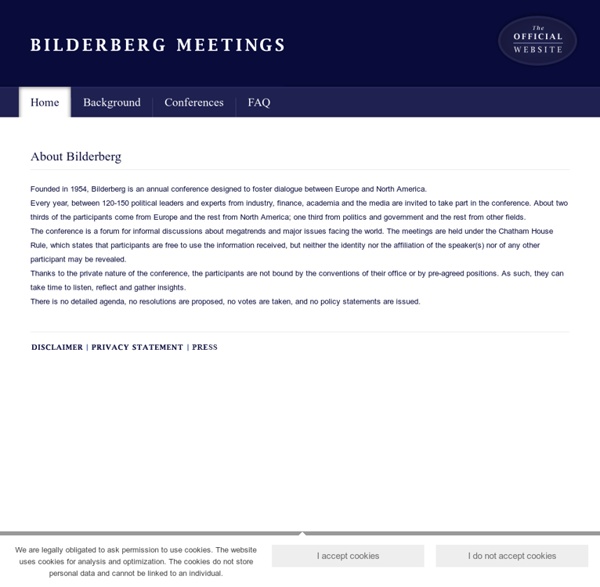



1973 Trilateral Commission The Trilateral Commission is a non-governmental, non-partisan discussion group founded by David Rockefeller[1] in July 1973, to foster closer cooperation among North America, Western Europe, and Japan. History[edit] Founding[edit] Sensing a profound discord among the nations of North America, Europe and Japan, the Trilateral Commission was founded to foster substantive political and economic dialogue across the world. To quote its founding declaration: "Growing interdependence is a fact of life of the contemporary world. Zbigniew Brzezinski, United States National Security Advisor to President Jimmy Carter from 1977 to 1981, and a professor at Columbia University and Rockefeller advisor who was a specialist on international affairs, left his post at the time to organize the group along with:[3] Henry D. Other founding members included Alan Greenspan and Paul Volcker, both later heads of the Federal Reserve system. Meetings[edit] Membership[edit] Criticisms[edit] From the left[edit]
FreedomInfo Le secret des Sept Soeurs (Docus) [VF] Les 7 sœurs, ce sont les sept compagnies pétrolières dont les dirigeants se sont partagés le monde, au cours d'une chasse au coq de bruyère, en 1928. Une partie de chasse dont les conséquences secouent encore la planète... C'est cette "véritable et inavouable histoire du pétrole" que raconte le réalisateur Frédéric Tonolli dans un documentaire de 210 minutes e n quatre parties, produit par Sunset Presse, pour France 5, depuis l'été 2009. Un projet très ambitieux, mêlant archives, reconstitutions, entretiens chocs et "road movie pétrolier dans un monde de brut". 1. Dès le début du siècle et, plus encore après la Seconde Guerre mondiale, les grandes puissances occidentales nouent des relations étroites avec les états pétroliers afin d'assurer aux sept soeurs la mainmise sur les gisements du Moyen-Orient. En 1960, les états producteurs de pétrole s'unissent et créent l'OPEP. 2. Le Moyen-Orient n'a pas constitué l'unique source de pétrole pour le monde occidental. 3. 4.
Munich Security Conference 1954 Bilderberg Group The Bilderberg Group, Bilderberg conference, Bilderberg meetings or Bilderberg Club is an annual private conference of approximately 120–150 political leaders and experts from industry, finance, academia and the media.[1][2] About two thirds of the participants come from Europe and the rest from North America; one third from politics and government and the rest from other fields.[1][3] §Origin[edit] The original conference was held at the Hotel de Bilderberg in Oosterbeek, Netherlands, from 29 to 31 May 1954. It was initiated by several people, including Polish politician-in-exile Józef Retinger, concerned about the growth of anti-Americanism in Western Europe, who proposed an international conference at which leaders from European countries and the United States would be brought together with the aim of promoting Atlanticism – better understanding between the cultures of the United States and Western Europe to foster co-operation on political, economic and defense issues.[4]
UNHCR:Facts and Figures on Refugees Number of forcibly displaced worldwide: 59.5 million Number of Refugees There were 19.5 million refugees worldwide at the end of 2014, 14.4 million under the mandate of UNHCR, around 2.9 million more than in 2013. The other 5.1 million Palestinian refugees are registered with the United Nations Relief and Works Agency (UNRWA). During the year, conflict and persecution forced an average of 42,500 persons per day to leave their homes and seek protection elsewhere, either within the borders of their countries or in other countries. Developing countries host over 86% of the world’s refugees, compared to 70% ten years ago. In 2014, the country hosting the largest number of refugees was Turkey, with 1.59 million refugees. Last year, 51% of refugees were under 18 years old. An estimated 13.9 million people were newly displaced due to conflict or persecution, including 2.9 million new refugees. Internally Displaced Persons (IDPs) Asylum-Seekers Find out about asylum in the UK. Stateless People
Russie : un budget de réarmement sans précédent de 488 milliards d’euros Le réarmement de l’armée russe, dont le financement dépassera 20.000 milliards de roubles (près de 488 mds EUR) d’ici 2020, ne sera pas reporté, certaines dépenses pouvant toutefois être rééchelonnées, a annoncé lundi Andreï Belooussov, ministre du Développement économique. Vladimir Poutine avait parler le 20 Février 2012, d’un réarmement massif de la Russie à hauteur de 590 milliards d’euros, afin de contrer la politique conjointe de l’Otan et des Etats-Unis en Europe. En Novembre 2011, le président russe Dmitri Medvedev avait parlé de déployer des missiles balistiques à Kaliningrad, aux portes de l’UE, si les Etats-Unis et l’Otan continuaient de mettre Moscou devant le "fait accompli" avec le déploiement de leur bouclier antimissile en Europe. Source : RIA Novosti / Minuit moins une Like this: J'aime chargement… Catégories:Défense, Russie Tags:Armée, Budget, Dailymotion, medvedev, Militaire, minuit, novosti, Russie, vladimir poutine
Handelsblatt Global Edition 1921 Council on Foreign Relations The Council on Foreign Relations (CFR) is an American nonprofit, nonpartisan membership organization, publisher, and think tank specializing in U.S. foreign policy and international affairs. The CFR is considered to be the nation's "most influential foreign-policy think tank".[1] Its membership has included senior politicians, more than a dozen Secretaries of State, CIA directors, bankers, lawyers, professors, and senior media figures. The CFR regularly convenes meetings at which government officials, global business leaders and prominent members of the intelligence/foreign-policy community discuss major international issues. The CFR was founded in 1921 and is headquartered in New York City, with an additional office in Washington, D.C.. History[edit] Origins[edit] Elihu Root, a powerful corporate lawyer who served as Secretary of State, Secretary of War, and U.S. Cold War era[edit] Dwight D. Vietnam created a rift within the organization. Current status[edit] Mission[edit] Membership[edit]